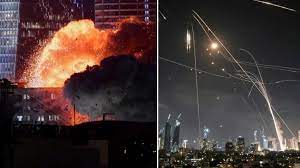Explosions Shake Tehran Amid U.S.-Brokered Ceasefire Breakdown
Tehran, June 24, 2025 — Multiple explosions shook the outskirts of Iran’s capital on Monday night, just hours after former U.S. President Donald Trump had publicly declared that Israeli airstrikes on Iran had ceased following a U.S.-brokered ceasefire. The blasts, which eyewitnesses described as “massive and sudden,” were later confirmed by Israeli Army Radio as strikes targeting a radar installation near Tehran—raising serious doubts about the viability of the ceasefire agreement and deepening geopolitical uncertainty in the region.
Initial confusion followed as Israeli Prime Minister Benjamin Netanyahu’s office maintained that Israel had fully complied with the ceasefire terms since Trump’s intervention. However, the sound of two powerful explosions heard across northern Tehran directly contradicted these assurances. Iranian state media quickly reported “foreign aggression” near a military communications hub, but provided few additional details.
This apparent contradiction between political declarations and battlefield activity has sparked renewed concern among diplomats, analysts, and military observers alike.
Trump’s Rare Rebuke of Israel Highlights U.S. Frustration
While en route to the NATO summit in The Hague, Trump issued a stern rebuke directed at Israel, an unusual move for the former president, who has often expressed strong support for Netanyahu’s administration. “All planes will turn around and head home,” Trump said in a televised statement, alluding to U.S. military movements in the Gulf. “De-escalation means no more fire, no more retaliation—not after we’ve agreed to stand down.”
Trump’s sharp criticism came amid his efforts to position himself as the primary architect of what he called a “forever ceasefire” between Iran and Israel. The renewed violence significantly complicates that narrative and exposes the fragile and fragmented nature of ceasefire enforcement in a highly volatile theater.
Strategic Misalignment or Tactical Defiance?
Defense analysts argue that the disconnect between ceasefire claims and actual strikes could indicate multiple scenarios: a breakdown in military coordination, rogue or autonomous decisions by field commanders, or deliberate tactical defiance to maintain strategic leverage. Israeli Army Radio's report that “additional targeting was carried out” only reinforces the idea that operations may still be actively unfolding beneath the public surface of diplomacy.
“The explosions near Tehran reveal the difficulty of managing a truce in real-time combat conditions,” said Dr. Lina Barazani, a Middle East defense specialist at the Geneva Institute. “Field units may act independently to secure perceived advantages before diplomatic re-engagement begins in earnest.”
Ceasefire’s Credibility in Question
This latest incident underscores a growing fear among international mediators: that declared ceasefires are only loosely enforced, and vulnerable to breakdown through miscommunication, strategic opportunism, or deliberate political maneuvering. The timing of the Tehran blasts—so soon after Trump’s announcement—has severely tested the credibility of all parties involved.
Iranian officials have so far refrained from directly accusing Israel of violating the ceasefire, though government spokesperson Ali Khosravi said, “We are monitoring all violations and reserve the right to respond.” Regional intelligence agencies report heightened alert levels across Iran’s missile defense and cyber divisions, indicating a readiness for retaliatory action should provocations continue.
Regional Reaction and Market Impact
Financial and energy markets responded quickly to the news. Asian stock markets, which had seen early gains following Trump’s ceasefire declaration, slowed their rally as reports of the Tehran explosions surfaced. Brent crude oil rebounded, climbing nearly 2.5% in late-day trading amid concerns that renewed military exchanges could disrupt supply flows through the Strait of Hormuz.
Gulf nations, already in crisis response mode, accelerated security measures across critical infrastructure, ports, and oil terminals. The United Arab Emirates and Saudi Arabia reportedly updated shipping advisories and increased drone surveillance near their respective coastlines.
Diplomacy Under Strain
Back in Europe, international diplomatic actors scrambled to respond. A joint statement by EU foreign policy chief Josep Borrell and NATO Secretary-General Jens Stoltenberg called for “restraint, clarity in military communications, and immediate efforts to validate and verify ceasefire compliance on the ground.”
The United Nations has also requested emergency monitoring from its observer mission in the region, though its access remains limited by both Iranian and Israeli authorities. A new round of talks in Vienna is being considered for later this week, depending on developments.
A Fragile Truce in a Fluid Battlefield
The events of June 24 have highlighted just how tenuous the current truce truly is. Despite high-level diplomatic efforts and public declarations of peace, the realities on the ground continue to evolve, often outpacing official narratives. As rival factions seek leverage ahead of the next round of negotiations, unilateral actions—like the radar strike near Tehran—could trigger further escalation and undermine international mediation.
With global energy markets, regional security protocols, and diplomatic capital now hanging in the balance, the world watches anxiously to see whether this ceasefire will hold—or if the region is on the verge of another descent into open warfare.
News Source: https://www.reuters.com/world/middle-east/trump-announces-israel-iran-ceasefire-2025-06-23/ reuters.com+15reuters.com+15theguardian.com+15theguardian.com








